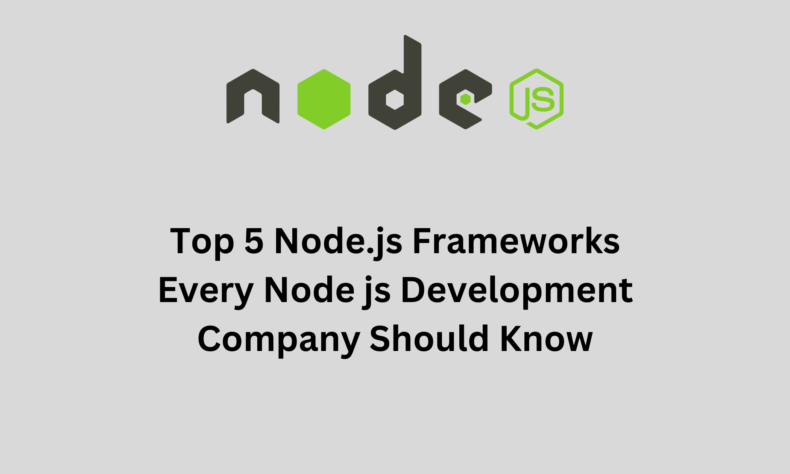
Nodejs is a prevalent JavaScript runtime that powers over millions of web applications; popular names include Paypal, Uber, Firefox, and many others. It is built upon Google’s V8 engine. Due to its exceptional speed and ability to execute JavaScript outside browsers, it remains one of the most popular JavaScript runtime environments. With the growing usage of Node.js in backend development, several frameworks exist for Node.js development services.
Nodejs frameworks
Frameworks typically abstract away the complexities in developing basic and even advanced features of applications so developers can focus on crucial aspects of development. For example, many frameworks have an in-built ORM tool allowing programmers to quickly establish communication with the database without learning the underlying technologies.
In addition, they come up with pre-built tools to facilitate faster node js development and provide an ecosystem to maintain and manage code. Overall, the frameworks help you focus on developing complex functionalities while they take care of basic functionality by offering pre-built basic features of the application.
Also Read: Guest posting sites
When comparing different frameworks, it can be challenging to rank them definitively because each framework is designed with specific purposes in mind. For instance, some frameworks prioritize simplicity and ease of learning, making them suitable for lightweight applications, while others are more robust and suitable for handling heavy application development.
However, specific node.js frameworks have gained popularity due to their extensive testing and strong community support, crucial factors in determining the proper framework. Community backing plays an essential role in the evolution and success of a framework and its associated projects. Without delay, let’s explore some of the well-known node.js frameworks.
Top Nodejs Frameworks for App Development
Nest.js
Nestjs is a Typescript-based server-side development framework, meaning developers can achieve functionalities beyond JavaScript. TypeScript is a superset of JavaScript that enables developers to use static composing, classes, and interfaces in their programs. Thanks to its static-typed nature, finding errors when you code in TypeScript is also easier.
Nestjs has all the whistles and bells you can expect in a modern Nodejs development framework, including a modular architecture for easy codebase organization and a more flexible environment.
The modular architecture, TypeScript support, and robust community support make it one of the most sought-after frameworks among developers. Furthermore, it is a well-tested and established framework for building enterprise-grade applications.
With the help of Nest.js, you can develop APIs and MVC(Model View Controller) applications, microservices, GraphQL applications, Web Sockets, and much more.
Express.js
It has more GitHub stars than any other Nodejs framework out there. Express.js, or simply Express, is the most popular Nodejs framework. It is minimalistic and unopinionated and provides developers with a flexible nodejs development ecosystem.
The framework is well-tested, robust, fast, and unopinionated for building multi-page, single-page, and hybrid web applications.
It’s an open-source Node.js framework and part of the MEAN stack. Express has MVC architecture that lets you store business and logic code separately, facilitating better code management. It supports packet injection to expand its capacity.
In addition, it comes up with debugging tools to help developers find bugs without relying on third-party tools.
Koa.js
Koa, developed by the same team responsible for Express, takes things up a notch by including enhanced functionality not found in Express while maintaining its lightweight nature. Some even call it a “lighter” version of Express. To give you an idea of its weight, Koa consists of 550 lines of code, making it an extremely lean framework.
It is more expressive, provides more flexibility in expressing complex ideas, and has a better error-handling mechanism. The other key difference between Koa and Express is that Koa uses promises and async functions that make error handling simpler.
Hapi.js
Hapi.js (short for Http-API) is a framework for developing APIs, HTTP-proxy applications, and websites. It was developed by the mobile team at Walmart Labs and was initially created using Express.js. However, it later evolved into a stand-alone framework.
Similar to Express, it differs from its counterpart in handling requests. Express.js relies on middleware for request processing, and Hapi.js uses plugins. It has all the plugins you can expect that accelerate your development journey. You can get plugins for documentation, authentication, and more. As a result, you can save time developing basic functionalities from scratch.
You can combine it with MySQL, MongoDB, and Postgres to build static websites. In addition, you can use it with any front-end framework, like React, Angular, and Vue.js.
Sails.js
Sails.js is a popular framework due to its feature-rich nature. It has waterline ORM (Object-Relational Mapping) that makes it easy to talk to databases, eliminating the need to write raw SQL queries – Sails.js handles it all for you.
It is created as a front-end agnostic framework so developers can work with their preferred front-end framework or library. So if you’re already comfortable with a specific tech, you can plug it in.
If you are developing real-time applications, Sails.js can be the right choice. Easy integration of WebSockets allows you to build real-time features without breaking a sweat. For developers who love to work with auto-generated REST APIs, too, this framework has the capabilities to generate REST APIs.
Overall, Sails.js is a decent framework for getting your web apps up and running fast, especially if you’re into developing real-time web apps. It is built to make the development process easier and faster with all these tools and abstractions.
Conclusion
This article has compiled the top Node.js frameworks for developers, highlighting how they differ. Remember, selecting the right tool depends heavily on the project’s requirements.
If you’re just starting, you can contact us for complex enterprise-grade robust applications using Node.js development services. We offer extensive services, from API development to real-time applications. Whether you prefer to hire a dedicated Node.js developer or engage in project-based collaboration, we can accommodate your needs.
For more information or to discuss your requirements, please contact us today. We are here to assist you with your Node.js development endeavors.




